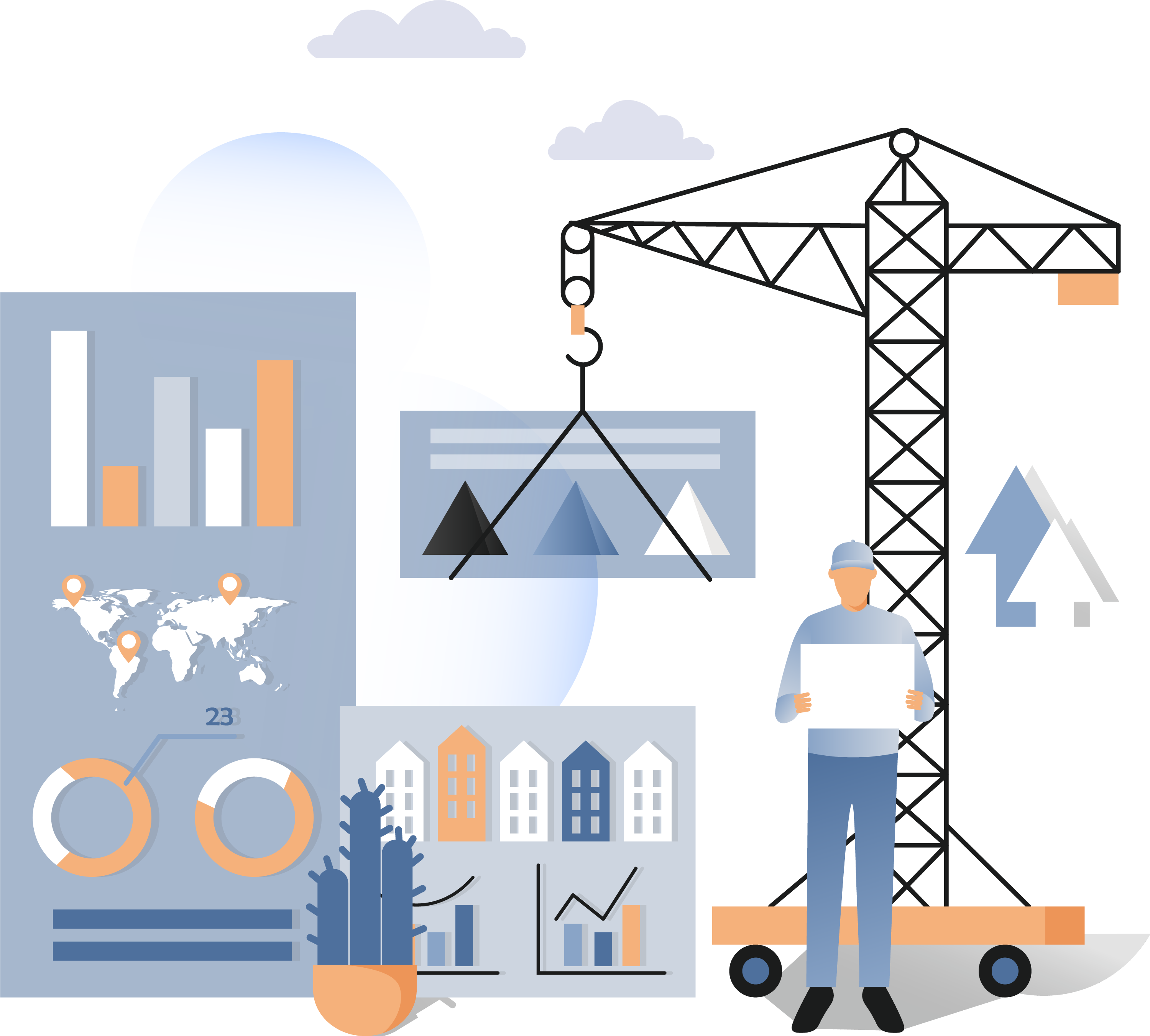Project managers are essential for keeping development projects on track; as part of a development team, they execute the planning, tracking, and overseeing of tasks to achieve specific goals within the time and constraints of a given project. Real estate project managers oversee project planning, managing expenditures and timelines, and fostering collaboration among project team members, stakeholders, and the customer. Luckily, modern strategies and tools can help project management teams manage budgets, keep timelines on track, and collaborate effectively across teams.
Wondering what differentiates an exceptional real estate project manager from an average one? Superstar project managers don’t just keep things moving—they unlock value, reduce risk, and keep projects on schedule in ways that compound over time. The difference is huge: over the lifecycle of a complex development, superstar PMs can generate results that make them uniquely valuable.
In this guide, we’ll walk through the responsibilities and best practices used by the best in the business —and how your project managers at any level can elevate their performance using modern strategies and technology.
What Does a Real Estate Project Manager Do?
At a high level, a real estate project manager (sometimes titled development manager or director) is responsible for keeping projects on time, on budget, and aligned with business goals from acquisition to closeout. But not all PMs operate the same way. Average project managers often look busy but focus on low-impact work—missing critical deadlines and allowing budgets to slip. They may take a passive approach to scheduling, thinking in months instead of days, and slowly accumulating costly delays.
In contrast, superstar project managers prioritize the tasks that drive outcomes. They stay laser-focused on moving the critical path forward—even when that means working on high-effort, high-impact tasks they don’t enjoy. They see time as a precious resource, and one lost day is a major red flag.
Core Responsibilities of a Real Estate Project Manager
Every real estate project manager will have unique expectations, but several key day-to-day tasks are common, such as overseeing timelines, budgets, stakeholder communication, and construction milestones:
Here are few of the core responsibilities project managers are typically responsible for:
- Budget development and financial oversight
- Creating and managing project timelines and schedules
- Vendor and contractor selection, negotiation, and management
- Obtaining necessary permits and approvals
- Risk identification and mitigation
- Regular progress reporting to stakeholders
- Quality control throughout the project lifecycle
- Coordination of design teams, engineers, and construction crews
Most commercial real estate project management requires establishing a clear sense of the project scope; facilitating open communication across teams, channels, or stakeholders; proactive mitigation of risk at every stage of the lifecycle; flexibility in the face of changes or updates and a clear process for change orders or other modifications; ensuring that vendor delivery is high quality; and handing off the final project successfully to the owner and making sure construction meets client standards.
Common Challenges
Project managers will also be responsible for overcoming obstacles which arise across the development process. Here are a few of the common challenges developers face over the construction process:
- Unexpected site conditions or environmental concerns
- Regulatory hurdles and changing compliance requirements
- Unreliable vendors or work that doesn’t meet quality standards
- Supply chain disruptions affecting material delivery
- Labor shortages or contractor performance issues
- Stakeholder conflicts regarding design or budget priorities
- Weather delays impacting construction schedules
Commercial vs. Residential Real Estate Project Management
Even though commercial and residential projects are sometimes combined in mixed-use developments, managing a development in each asset class will require slightly different processes. Understanding the unique expectations and challenges of each will help you move the project through the development process more smoothly.
Here’s a breakdown of the different requirements and processes you might encounter as you look to make each type of project:
| Commercial Projects | Residential Projects |
|---|---|
| Complex zoning and regulatory requirements | Community and homeowner association concerns |
| Multiple tenant considerations | Individual buyer preferences and customizations |
| Longer construction timelines | Faster turnover expectations |
| Higher emphasis on ROI metrics | More focus on aesthetic and lifestyle features |
| Greater need for ADA and accessibility compliance | Emphasis on energy efficiency and modern amenities |
Key Skills and Tools for Effective Project Management in Real Estate
Project managers who succeed on complex development projects are difficult to find and retain. Here are a few of the key skills and tools effective project managers should possess:
- Leading cross functional teams
- Managing stakeholder expectations and communication
- Looks for more efficient ways to manage costs and timelines
- Leverage data driven tools to forecast expenses, optimize resource allocation, and proactively plan around risk
- Early adopters of technologies that free up time for high-value work, such as real estate development software
Commercial Real Estate Project Management Technology
Superstar project managers don’t waste hours on manual tasks. They embrace automation and cloud-based software to centralize project data, avoid duplicative work, and collaborate in real time. This allows them to maintain constant visibility into project health, timelines, and budget status—without drowning in spreadsheets.
Here are a few key ways PMs can improve the project management process by relying on real estate technology:
- Leverage automated real estate project tools to process incoming documents, index information, update budgets, process draw requests and get more done
- Ensure you can inform decision-making with data that is accurate, up-to-date, and complete
- Track and manage your entire project with real-time reports and dashboards
- Use forward-looking data and proactive alerts to take early action on risks and opportunities during the project lifecycle
- Centralize cost and vendor data to make quick decisions instead of chasing down your accounting team for information
- Easily send all invoices to your accounting system
PMs who use commercial real estate project management technology can reduce the risk of human error and unlock real-time insights. Instead of reacting to what’s already happened, they can plan with confidence and prevent issues before they escalate.
Risk Management and Financial Optimization
Risk mitigation and budget forecasting are essential to keep large projects on track, allowing you to identify potential pitfalls early and prevent setbacks from derailing your finances or project timelines. Risks are inevitable in real estate, but how a project manager prepares for and responds to them makes all the difference. Average PMs are often reactive—explaining what went wrong after the fact. Superstar PMs anticipate problems in advance. They’re constantly scenario planning and identifying how even minor decisions could impact the timeline, budget, or quality of delivery.
Pre-development cost management can play an important role in preventing budget related setbacks such as scope gaps, change orders, or resource shortages. Be sure your team has the ability to accurately predict costs in the earliest stages of a project, including acquisition, design, or permitting, or more. Learning the right tips and tools for managing budgets during pre-development is essential to ensure success in the next stages of your project.
Risk Mitigation and Budget Alignment
Risk mitigation and budget alignment are essential in commercial real estate development. When you de-risk projects early on, you’ll be less susceptible to pitfalls further on and can ensure a more predictable development process. Understanding potential threats to your project allows your team to be more proactive and nimble. You should also be sure your budget aligns with your development teams overall goals, and that projects are optimized to meet
Do’s:
- Centralize key project data in a single platform with real-time updates for all relevant stakeholders
- Leverage historical vendor data for construction risk mitigation
- Coordinate with finance, legal, and construction stakeholders to maintain project compliance
Don’ts:
- Underestimate or neglect risk mitigation practices
- Ignore the due diligence process, including financial statements, lease agreements, and site evaluations
- Use outdated and error-prone workflows to manage critical project data
- Settle for poor communication with internal and external stakeholders
- Fail to track budgets or plan contingency in case of cost overruns or change orders
The Future of Project Management Is Here: Are You Ready?
The most successful project managers are the ones who know the ins and outs of the job’s responsibilities, who use effective and modern tools, and who are able to align budgets with their firm’s larger goals. There are several ways you can begin to rethink and optimize your project management workflows. Get started by implementing a new strategy, such as looking for more cost-effective ways to manage times, and consider the role technology could play.
Even if you rethink how you approach one piece of your project workflow – such as budget tracking, scheduling, or vendor coordination – you’ll see a major impact across your development team. Modern real estate development software like Northspyre can help you streamline operations
Book a demo to learn more about how Northspyre’s platform ensures commercial real estate project success.



